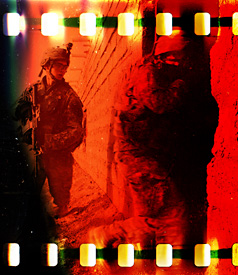A good friend noted recently how little we hear of Iraq and Afghanistan in the news anymore, and further noted the deafening silence regarding those ongoing wars from what he described as "dishwater left-leaning political activists" whose disengagement from the issue, according to him, makes them full of something I can't repeat in print. That bogus disengagement, he asserts, stems from the fact that Obama is in office now, so everything must be OK. It isn't, of course, but it is hard to miss the fact that we haven't heard much about the wars, or the protesters, since a couple of Januarys ago.
It's hard to argue against his point, and worse, the sense of being made of dishwater myself is difficult to avoid. I've written about the deadly messes in Iraq and Afghanistan several times in the last year or so, but it is nothing compared to the focus I had on those two conflicts going back to 2002. Back then, and until 2009, I wrote three books on those two wars, discussed them in detail in this space on a weekly basis, joined political campaigns based solely on the candidate's stance on those conflicts, and went to dozens of public protests all over the country.
Why did my coverage of these conflicts get dialed back? There are several reasons, most of which sound like excuses. Obama's new administration brought forth a torrent of issues that also deserved coverage - the Sotomayor nomination, the retirement of Justice Stevens, the rescue of Detroit's auto industry, health care reform, and the eruption of right-wing insanity both in Congress and out in the streets, to name only a few - but in the end, my own attention has most definitely wandered from two wars that deserve much more attention.
Other reporters, like Truthout's own Dahr Jamail have certainly not stepped back from covering these conflicts. Jamail, who went to Iraq to see and report what was happening from the ground, has consistently reminded us that the mayhem and bloodshed continue unabated. In an article from last month, he noted:
It is highly unlikely that the US government will allow a truly sovereign Iraq, unfettered by US troops either within its borders or monitoring it from abroad, anytime soon. The Status of Forces Agreement (SOFA) between the Iraqi and US governments indicate an ongoing US presence past both the August 2010 deadline to remove all combat troops, and the 2011 deadline to remove the remaining troops.
According to all variations of the SOFA the US uses to provide a legal mandate for its nearly 1,000 bases across the planet, technically, no US base in any foreign country is "permanent." Thus, the US bases in Japan, South Korea and Germany that have existed for decades are not "permanent." Technically. Most analysts agree that the US plans to maintain at least five "enduring" bases in Iraq.
You don't see stuff like that in "mainstream" news reporting, but it is a fact nonetheless.






No comments:
Post a Comment